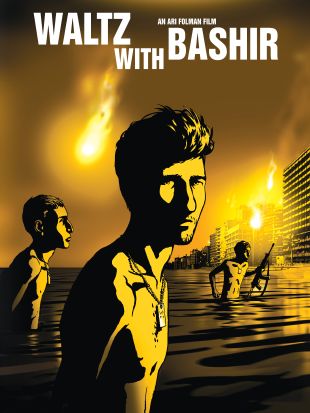
If anyone still harbors doubts as to whether animation can be used to tell a serious-minded story and not simply to entertain children on a Saturday morning, that questioning soul need look no further than Waltz With Bashir to witness just how effective the medium can be at dealing with mature issues with sincerity and reverence. Even if a soldier manages to avoid getting physically wounded in war, no one returns form the battlefield unscathed, and when filmmaker Ari Folman attempts to help a fellow veteran of the Lebanon War discover the hidden meaning of a recurring nightmare, he begins questioning the fact that the war seems to have had no discernible effect on him psychologically. But it has, and as his quest to help a friend find meaning in the abstract commences, Folman discovers that some memories can be so dark that it takes the light of reflection to illuminate them.
Over two decades after the first Lebanon War, an old friend of Folman's summons the filmmaker to a bar to discuss a recurring nightmare in which a pack of 26 vicious dogs sits snarling outside of his window, awaiting the perfect opportunity to strike. Eventually, the two men conclude that the nightmare has something to do with the Israeli mission during the war. Until this night, Folman always thought that he had managed to elude any such lingering trauma. Shortly after leaving the bar, however, he begins experiencing a strange vision in which he and two other soldiers emerge from the sea and walk into Lebanon, where a mob of screaming Palestinians begins to flood the streets. But Folman has no memory of the actual events that took place that day, only a fleeting vision that could possibly be related to the Sabra and Shatila massacre, where Christian Phalangists systematically slaughtered 2,000 Palestinians while their refugee camps were under control of the Israeli army. Folman has no memory of the actual massacre, so in order to get some answers he begins tracking down some of his old army friends. Piece by piece, the mystery begins to come together, prompting Folman to realize just what he had witnessed on that awful, fateful day.

Despite being a film that deals with so much death and sorrow, Waltz With Bashir is vital and vivid from the opening frames. It presents a sobering topic filtered through a hallucinogenic frame, and as such, it commands the audience's attention from the first thrilling second to the devastating final shot. Few films can honestly claim to be totally unique, but the way that Folman uses animation to recount his amazing psychological journey makes it truly one of a kind. It's a captivating mystery, a profound investigation into the power of memory, a soul-searching autobiography, and an unflinching war drama, all wrapped up in a highly stylized package that, when the truth finally emerges, emphasizes the horrifying realities of war and personal accountability in a way that cuts straight to the bone. As a filmmaker, Folman seems to realize that the best hope for instilling that message is to ensure that, despite the remarkably heavy and intense subject matter, Waltz With Bashir remains consistently entertaining. And it is, thanks to the striking visuals, expert pacing, and pulsating soundtrack.
Still, lest we find ourselves drifting too deep into the medium and forgetting the message, Folman sends us off with an expertly placed sucker punch that pulls us back to reality just in time to ensure that the message is not lost. Late in the film, a psychologist recounts to Folman the story of a war photographer who was able to mentally endure the horrible violence unfolding around him by simply viewing his surroundings as if looking through a camera lens. One day, upon witnessing the needless suffering of animals, his "camera" is inexplicably snatched away, leaving him completely vulnerable to the awful images he was previously capable of overlooking. After that incident, the photographer was incapable of doing his job. In the final moments of Waltz With Bashir, Folman essentially snatches away our collective "camera," forcing us to see the Sabra and Shatila massacre through his own eyes. It's a creative decision that will no doubt leave many viewers paralyzed with terror, yet also feels perfectly logical within the context, making Waltz With Bashir essential viewing for anyone foolish enough to believe that the rules of engagement hold any weight at all once the bombs start dropping.
